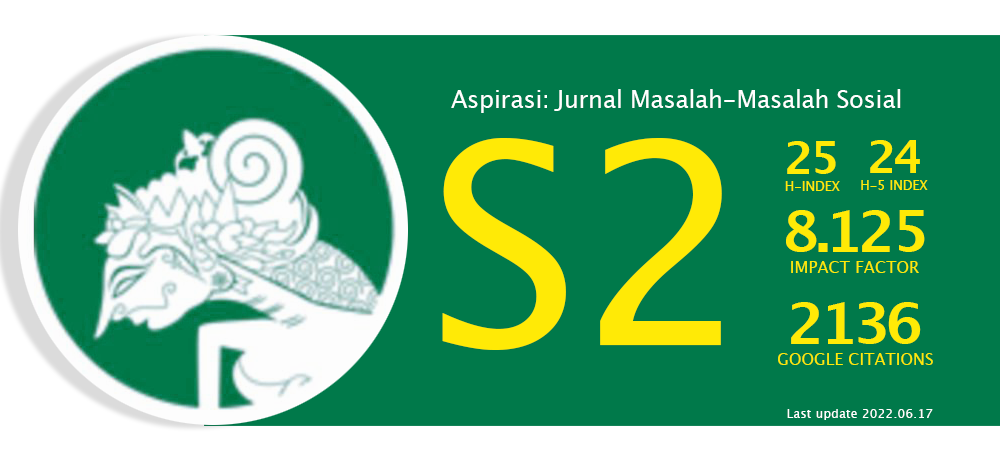Inovasi Manajemen Perencanaan untuk Peningkatan Mutu Madrasah dalam Situasi Covid-19
Abstract
This study aims to describe the efforts of madrasa institutions in Indonesia in preparing management plans to improve Islamic education's quality in strategic planning and curriculum. This study employed a descriptive quantitative design. The sample of this study was 68 respondents from different educational institutions. It was taken randomly using a cluster random sampling technique. The respondents were from different institutions in seven provinces of Indonesia.Data analysis used descriptive statistics. It described the entirety of the respondent's answers. The analysis obtained in this study involved two aspects: (1) the management of the strategic plan of Islamic educational institutions; and (2) the management of the institution's curriculum plan. For the management of the strategic plan, it was found that 82.4% of respondents made plans, 80.9% formulated plans carried out with the other parties, 83.8% formulated strategic steps, 89.7% formulated plans which included three competencies of cognitive, affective, and psychometric, 80.9% set targets which also covered four 21st century skills, and 91.2% said that professional teachers set the plan. On the management of the institution's curriculum plan, 91.2% of respondents planned a curriculum according to the Covid-19 pandemic situation, 88.2% curriculum adapted to the characteristics of students, 73.5% determined learning tools (objectives, material, media, etc.) according to learning needs, and finally, 76.5% of respondents provided services to improve teacher competence in implementing the curriculum.
Abstrak:
Penelitian ini bertujuan untuk mendeskripsikan upaya madrasah di Indonesia dalam menyusun manajemen perencanaan untuk meningkatkan mutu pendidikan Islam pada aspek rencana strategis dan inovasi perencanaan kurikulum dalam situasi Covid-19. Penelitian ini menggunakan desain kuantitatif deskriptif dengan jumlah sampel sebanyak 68 responden dari lembaga pendidikan Islam yang berbeda. Sampel diambil secara acak menggunakan teknik cluster random sampling danresponden berasal dari madrasah yang tersebar di tujuh provinsi di Indonesia. Analisis data menggunakan statistik deskriptif yang menggambarkan keseluruhan dari jawaban responden. Berdasarkan temuan dan analisis, diperoleh kesimpulan dua aspek penting yaitu: (1) inovasi manajemen rencana strategis madrasah; dan (2) inovasi perencanaan kurikulum dalam situasi Covid-19. Terkait manajemen rencana strategis madrasah diperoleh sebanyak rata-rata 82,4% responden melakukan penyusunan rencana, 80,9% merumuskan rencana bersama pihak lain, 83,8% merumuskan langkah-langkah strategis, 89,7% merumuskan tiga kompetensi mencakup kognitif, afektif, dan psikomotorik, 80,9% menentukan target yang sudah mencakup empat keterampilan abad 21, dan 91,2% perencanaan dilakukan oleh guru yang profesional di bidangnya. Sementara, inovasi perencanaan kurikulum dalam situasi Covid-19 ditemukan bahwa sebanyak rata-rata 91,2% responden merencanakan kurikulum sesuai dengan situasi pandemi Covid-19, 88,2% kurikulum disesuaikan dengan karakteristik peserta didik, 73,5% menentukan perangkat pembelajaran (tujuan, materi, media, dll.) sesuai dengan kebutuhan belajar, dan terakhir 76,5% madrasah memberikan layanan untuk meningkatkan kompetensi guru dalam mengimplementasikan kurikulum situasi Covid-19.
Keywords
Full Text:
PDFReferences
Abouzeedan, A. (2011). SME performance and its relationship to innovation [Dissertation No. 1364]. Linköping Studies in Science and Technology.
Adedoyin, O. B., & Soykan, E. (2020). Covid-19 pandemic and online learning: the challenges and opportunities. Interactive Learning Environments, 1–13. https://doi.org/10.1080/10494820.2020.1813180
Aliyyah, R. R., Rachmadtullah, R., Samsudin, A., Syaodih, E., Nurtanto, M., & Tambunan, R. R. S. (2020). The perceptions of primary school teachers of online learning during the COVID-19 pandemic period: A case study in Indonesia. Journal of Ethnic and Cultural Studies, 7(2), 90–109. https://doi.org/10.29333/ejecs/388
Alsoufi, A., Alsuyihili, A., Msherghi, A., Elhadi, A., Atiyah, H., Ashini, A., Ashwieb, A., Ghula, M., Hasan, H. B., Abudabuos, S., Alameen, H., Abokhdhir, T., Anaiba, M., Nagib, T., Shuwayyah, A., Benothman, R., Arrefae, G., Alkhwayildi, A., Alhadi, A., … Elhadi, M. (2020). Impact of the COVID-19 pandemic on medical education: Medical students’ knowledge, attitudes, and practices regarding electronic learning. PloS One, 15(11), 1–20. https://doi.org/10.1371/journal.pone.0242905
Amin, H., Sinulingga, G., Desy, D., Abas, E., & Sukarno, S. (2021). Issues and management of Islamic education in a global context. Nidhomul Haq: Jurnal Manajemen Pendidikan Islam, 6(3), 608–620. https://doi.org/10.31538/ndh.v6i3.1808
Anwar, M. (2018). Menjadi guru profesional. Prenada Media.
Aquilani, B., Silvestri, C., Ruggieri, A., & Gatti, C. (2017). A systematic literature review on total quality management critical success factors and the identification of new avenues of research. The TQM Journal, 29(1), 184–213. https://doi.org/10.1108/TQM-01-2016-0003
Bentley, T. (2012). Learning beyond the classroom: education for a changing world. Routledge.
Bunbury, S. (2020). Disability in higher education – do reasonable adjustments contribute to an inclusive curriculum? International Journal of Inclusive Education, 24(9), 964–979. https://doi.org/10.1080/13603116.2018.1503347
Cahapay, M. B. (2020). Rethinking education in the new normal post-covid 19 era: A curriculum studies perspective. Aquademia, 4(2), 1–5. https://doi.org/10.29333/aquademia/8315
Dhawan, S. (2020). Online learning: A panacea in the time of COVID-19 crisis. Journal of Educational Technology Systems, 49(1), 5–22. https://doi.org/10.1177/0047239520934018
Enneking, K. M., Breitenstein, G. R., Coleman, A. F., Reeves, J. H., Wang, Y., & Grove, N. P. (2019). The evaluation of a hybrid, general chemistry laboratory curriculum: Impact on students’ cognitive, affective, and psychomotor learning. Journal of Chemical Education, 96(6), 1058–1067. https://doi.org/10.1021/acs.jchemed.8b00637
Fagerholm, F., Hellas, A., Luukkainen, M., Kyllönen, K., Yaman, S., & Mäenpää, G. (2018). Designing and implementing an environment for software start-up education: Patterns and anti-patterns. Journal of Systems and Software, 146, 1–13. https://doi.org/10.1016/j.jss.2018.08.060
Fauziyah, I., Akbar, B., Effendy, K., & Lukman, S. (2020). Implementation of gender mainstream policy in the implementation of the duties and functions of people’s representatives of the Republic of Indonesia. Journal of Public Administration and Governance, 10(3), 73–90.
Furnham, A. (2019). Culture shock: A review of the literature for practitioners. Psychology, 10(13), 1832–1855. https://doi.org/10.4236/psych.2019.1013119
Gaspersz, V. (3003). Total quality management (TQM). Gramedia Pustaka Utama.
Gibson, D. V., van Geenhuizen, M. S., Ibarra-Yunez, A., & Heitor, M. V. (Eds.). (2005). Regional Development and Conditions for Innovation in the Network Society. Purdue University Press.
Habibi, A., Mukminin, A., Yaqin, L. N., Parhanuddin, L., Razak, R. A., Nazry, N. N. M., Taridi, M., Karomi, & Fathurrijal. (2021). Mapping instructional barriers during COVID-19 outbreak: Islamic education context. Religions, 12(1), 1–14. https://doi.org/10.3390/rel12010050
Hanafi, Y., Taufiq, A., Saefi, M., Ikhsan, M. A., Diyana, T. N., Thoriquttyas, T., & Anam, F. K. (2021). The new identity of Indonesian Islamic boarding schools in the “new normal”: The education leadership response to COVID-19. Heliyon, 7(3), 1–10. https://doi.org/10.1016/j.heliyon.2021.e06549
Hoover, A. G., Heiger-Bernays, W., Ojha, S., & Pennell, K. G. (2021). Balancing incomplete COVID-19 evidence and local priorities: Risk communication and stakeholder engagement strategies for school re-opening. Reviews on Environmental Health, 36(1), 27–37. https://doi.org/10.1515/reveh-2020-0092
Jackson, D. (2017). Developing pre-professional identity in undergraduates through work-integrated learning. Higher Education, 74(5), 833–853. https://link.springer.com/article/10.1007/s10734-016-0080-2
Jeseviciute-Ufartiene, L. (2014). Importance of planning in management developing organization. Journal of Advanced Management Science, 2(3), 176–180. https://doi.org/10.12720/joams.2.3.176-180
Kabeyi, M. J. B. (2019). Organizational strategic planning, implementation and evaluation with analysis of challenges and benefits. International Journal of Applied Research and Studies, 5(6), 27–32. https://doi.org/10.22271/allresearch.2019.v5.i6a.5870
Khairiah, & Sirajuddin. (2019). The effects of university leadership management: Efforts to improve the education quality of state institute for Islamic studies (IAIN) of Bengkulu. Jurnal Pendidikan Islam Yogyakarta, 7(2), 239–266. https://doi.org/10.14421/jpi.2018.72.239-266
Kholifah, N., Subakti, H., Saputro, A. N. C., Nurtanto, M., Ardiana, D. P. Y., Simarmata, J., & Chamidah, D. (2021). Inovasi Pendidikan (R. Watrianthos & A. Rikki, Eds.). Yayasan Kita Menulis.
Komalasari, Arafat, Y., & Mulyadi. (2020). Principal’s management competencies in improving the quality of education. Journal of Social Work and Science Education, 1(2), 181–193. https://doi.org/10.52690/jswse.v1i2.47
König, J., Jäger-Biela, D. J., & Glutsch, N. (2020). Adapting to online teaching during COVID-19 school closure: teacher education and teacher competence effects among early career teachers in Germany. European Journal of Teacher Education, 43(4), 608–622. https://doi.org/10.1080/02619768.2020.1809650
Kumari, R., Kwon, K. S., Lee, B. H., & Choi, K. (2019). Co-creation for social innovation in the ecosystem context: The role of higher educational institutions. Sustainability, 12(1), 1–21. https://doi.org/10.3390/su12010307
Lin, M. H., Chen, H. C., & Liu, K. S. (2017). A study of the effects of digital learning on learning motivation and learning outcome. Eurasia Journal of Mathematics, Science and Technology Education, 13(7), 3553–3564. https://doi.org/10.12973/eurasia.2017.00744a
Machado, R. A., Bonan, P. R. F., Perez, D. E. d. C., & Martelli JÚnior, H. (2020). COVID-19 pandemic and the impact on dental education: Discussing current and future perspectives. Brazilian Oral Research, 34, 1–6. https://doi.org/10.1590/1807-3107bor-2020.vol34.0083
Malik, A. (2019). Creating competitive advantage through source basic capital strategic humanity in the industrial age 4.0. International Research Journal of Advanced Engineering and Science, 4(1), 209–215. https://doi.org/10.5281/zenodo.2588251
Maturidi. (2016). Prinsip perencanaan manajemen pendidikan Islam perspektif Al-quran. Al-Mabsut: Jurnal Studi Islam dan Sosial, 10(1), 277–296. http://ejournal.iaingawi.ac.id/index.php/almabsut/article/view/119
Mundiri, A. (2017). Organizational culture base on total quality management in Islamic educational institutions. ADRI International Journal of Islamic Studies and Social Sciences, 1(1), 1–11. https://lp3m.unuja.ac.id/unduh_jurnal/143/2017_Mundiri_Organizational%20Culture.pdf
Murkatik, K., Harapan, E., & Wardiah, D. (2020). The influence of professional and pedagogic competence on teacher’s performance. Journal of Social Work and Science Education, 1(1), 58–69. https://ejournal.karinosseff.org/index.php/jswse/article/download/10/10
Nganga, L. (2019). Preservice teachers perceptions of teaching for global mindedness and social justice: Using the 4cs (collaboration, critical thinking, creativity and communication) in teacher education. Journal of Social Studies Education Research, 10(4), 26–57. https://jsser.org/index.php/jsser/article/view/1262
Nurabadi, A., Sucipto, Juharyanto, & Gunawan, I. (2018, Oktober). The implementation of education management standards in the school laboratory state university of Malang for improving educational quality. 3rd International Conference on Educational Management and Administration (CoEMA 2018), 127–132. https://doi.org/10.2991/coema-18.2018.33
Nuryanto, A. (2015). Manajemen perubahan dalam peningkatan mutu sekolah. Direktorat Pembinaan Pendidik dan Tenaga Kependidikan Direktorat Jenderal Pendidikan Menengah, Kementerian Pendidikan dan Kebudayaan.
Offorma, G. C. (2016). Integrating components of culture in curriculum planning. International Journal of Curriculum and Instruction, 8(1), 1–8. https://ijci.wcci-international.org/index.php/IJCI/article/view/18/24
Palvia, S., Aeron, P., Gupta, P., Mahapatra, D., Parida, R., Rosner, R., & Sindhi, S. (2018). Online education: Worldwide status, challenges, trends, and implications. Journal of Global Information Technology Management, 21(4), 233–241. https://doi.org/10.1080/1097198X.2018.1542262
Pullman, M., & Wikoff, R. (2017). Institutional sustainable purchasing priorities: Stakeholder perceptions vs environmental reality. International Journal of Operations & Production Management, 37(2), 162–181. https://doi.org/10.1108/IJOPM-07-2014-0348
Rapanta, C., Botturi, L., Goodyear, P., Guàrdia, L., & Koole, M. (2020). Online university teaching during and after the covid-19 crisis: Refocusing teacher presence and learning activity. Postdigital Science and Education, 2(3), 923–945. https://doi.org/10.1007/s42438-020-00155-y
Rosita, T. (2014). Peranan, fungsi perencanaan, dan pembiayaan dalam manajemen pendidikan [Modul]. In Perencanaan dan pembiayaan pendidikan. Universitas Terbuka.
Saajidah, L. (2018). Fungsi-fungsi manajemen dalam pengelolaan kurikulum. Jurnal Isema: Islamic Educational Management, 3(2), 201–208. https://doi.org/10.15575/isema.v3i2.5012
Sahnan, M. (2017). Urgensi perencanaan pendidikan di sekolah dasar. Pelita Bangsa Pelestari Pancasila, 12(2), 142–159. https://pbpp.ejournal.unri.ac.id/index.php/JPB/article/view/4696
Sallis, E. (2014). Total quality management in education. Taylor & Francis. https://doi.org/10.4324/9780203417010
Saxena, C., Baber, H., & Kumar, P. (2021). Examining the moderating effect of perceived benefits of maintaining social distance on e-learning quality during COVID-19 pandemic. Journal of Educational Technology Systems, 49(4), 532–554. https://doi.org/10.1177/0047239520977798
Şéker, M., & Tatar, N. (2019). Investigating non-academic correlates of goal commitment for academic achievement at higher education level. Education and New Developments, 1, 64–68. https://doi.org/0.36315/2019v1end014
Simamora, R. M. (2020). The challenges of online learning during the covid-19 pandemic: An essay analysis of performing arts education students. Studies in Learning and Teaching, 1(2), 86–106. https://doi.org/10.46627/silet.v1i2.38
Sithole, A., Chiyaka, E. T., McCarthy, P., Mupinga, D. M., Bucklein, B. K., & Kibirige, J. (2017). Student attraction, persistence and retention in STEM programs: Successes and continuing challenges. Higher Education Studies, 7(1), 46–59. http://dx.doi.org/10.5539/hes.v7n1p46
Susanto. (2021a). The integration of digital literacy in learning at islamic elementary school to prevent the students’ deviant behavior. Al Ibtida: Jurnal Pendidikan Guru MI, 8(2), 205–221. https://doi.org/10.24235/al.ibtida.snj.v8i2.9125
Susanto. (2021b). The impact of the COVID-19 pandemic on mental condition and the need for psychological support of students in Jakarta. Jurnal Educative: Journal of Educational Studies, 6(1), 60–71. https://doi.org/10.30983/educative.v6i1.4467
Syazali, M., Sari, N. R., Sukawati, Sari, W. R., Pertiwi, S. D., Putra, A., & Putra, F. G. (2019). Islamic-nuanced linear algebra module with problem-based learning approach for linear equation system material. Journal of Physics: Conference Series, 1155(1), 1–11. https://doi.org/10.1088/1742-6596/1155/1/012097
Tassone, V. C., O’Mahony, C., McKenna, E., Eppink, H. J., & Wals, A. E. J. (2018). (Re-) designing higher education curricula in times of systemic dysfunction: A responsible research and innovation perspective. Higher Education, 76(2), 337–352. https://doi.org/10.1007/s10734-017-0211-4
Tran, L. T., & Soejatminah, S. (2017). Integration of work experience and learning for international students: From harmony to inequality. Journal of Studies in International Education, 21(3), 261–277. https://doi.org/10.1177/1028315316687012
Tu, J. C., Liu, L. X., & Wu, K. Y. (2018). Study on the learning effectiveness of Stanford design thinking in integrated design education. Sustainability, 10(8), 1–21. https://doi.org/10.3390/su10082649
Turner, S., & Harder, N. (2018). Psychological safe environment: A concept analysis. Clinical Simulation in Nursing, 18, 47–55. https://doi.org/10.1016/j.ecns.2018.02.004
Velasco, V., Griffin, K. W., Botvin, G. J., & Corrado Celata and Gruppo LST Lombardia. (2017). Preventing adolescent substance use through an evidence-based program: Effects of the Italian adaptation of life skills training. Prevention Science, 18(4), 394–405. https://doi.org/10.1007/s11121-017-0776-2
Wu, J., Guo, S., Huang, H., Liu, W., & Xiang, Y. (2018). Information and communications technologies for sustainable development goals: State-of-the-art, needs and perspectives. IEEE Communications Surveys & Tutorials, 20(3), 2389 - 2406. https://doi.org/10.1109/COMST.2018.2812301
Young, M. D., Winn, K. M., & Reedy, M. A. (2017). The every student succeeds act: Strengthening the focus on educational leadership. Educational Administration Quarterly, 53(5), 705–726. https://doi.org/10.1177/0013161X17735871
DOI: https://doi.org/10.46807/aspirasi.v13i1.3001
Refbacks
- There are currently no refbacks.







